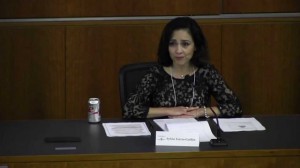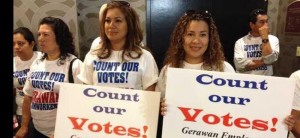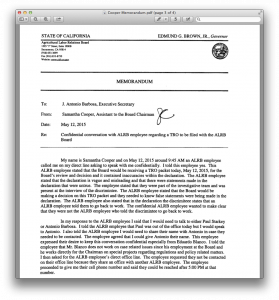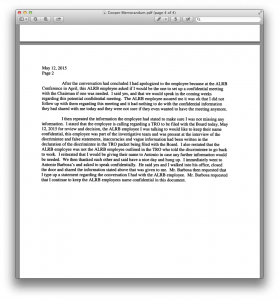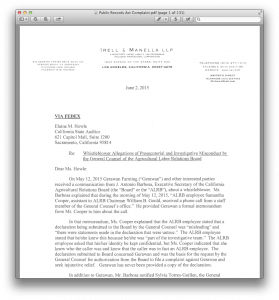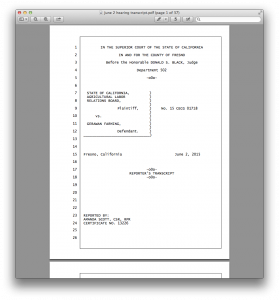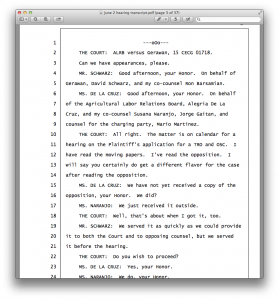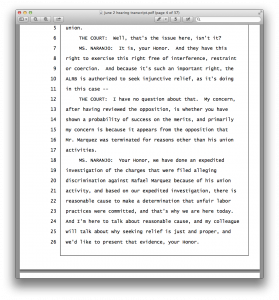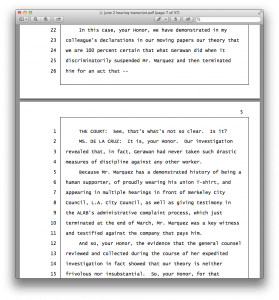State superior court delivers a stunning rebuke to Agricultural Labor Relations Board’s Top Staff Attorney Sylvia Torres Guillén, citing “deficiencies in its investigation” and staff “embroilment” in worker termination.
An employee whistleblower at the California Agricultural Labor Relations Board has exposed wrongdoing by the activist attorneys in the state agency responsible for protecting the rights of farmworkers. The charges, made by an insider who participated in an ALRB investigation of Gerawan Farming, were brought directly to the office of the Board’s chairman, William B. Gould IV. The whistleblower employee alleges that the ALRB General Counsel and staff submitted false or misleading sworn statements to the Board in order to get agency authorization to file enforcement proceedings against Gerawan.
These charges could reveal the extent to which the General Counsel Torres Guillén and staff manipulated evidence in administrative and legal proceedings in order to tip the scales – even perhaps illegally – in favor of the United Farm Workers.
The ALRB General Counsel’s office did not alert the Superior Court to the whistleblower’s allegations, or inform the court that it was hearing a case where a conscience-stricken employee raised troubling questions concerning the evidence filed with the judge. But after Gerawan raised the whistleblower allegations in court, and submitted over a dozen sworn declarations refuting the General Counsel’s charge that Gerawan fired a worker, Rafael Marquez, supposedly because of his pro-union activism , the superior court threw out the ALRB’s request for a temporary restraining order against Gerawan.
In his ruling, Judge Donald S. Black cited the ALRB for “deficiencies” in the investigation of the firing, “apparent embroilment of the ALRB’s staff in the investigation,” and – most concerning–the ALRB staff’s “involvement in the termination of Mr. Marquez” that triggered a false emergency to justify the Board OK’ing the petition to the court for an injunction.
Sources in Sacramento say the ALRB members and staff are in a frenzy, with fingers pointing at the board’s controversial General Counsel, Sylvia Torres-Guillén. Appointed by Gov. Jerry Brown in 2011, Torres-Guillén has hired a network of lawyers with long histories of UFW activism.
Judge Black is the fifth state court in two years to slap down Torres-Guillén’s cases against Gerawan Farming and its employees.
It’s not clear whether the Board was told of the staff’s involvement in the events leading to the worker’s termination when it gave Torres-Guillén’s attorneys the green light to file this case. Gerawan asked the Board to disclose what the General Counsel did, or did not reveal. The Board has so far refused to provide these documents. A lawsuit under the Public Records Act to compel the Board to turn over the so-called “TRO packet” submitted by the General Counsel’s staff to the Board is now pending in Sacramento Superior Court.
If the charges prove out, the California Bar, or a court, may initiate some long overdue housecleaning at the ALRB. Whether the Board acts remains to be seen. So far, it hasn’t tipped its hand as to what actions it intends to take to sort out what may be the most serious crisis of credibility in the agency’s 40-year history.
The Whistleblower
The story begins on May 12, when a field investigator, who works on the General Counsel’s staff, made a confidential call to Chairman Gould’s office. That staffer works in the Visalia Regional Office of the ALRB. He or she blew the whistle on the director of that office – Silas Shawver — and his boss, Sylvia Torres-Guillén.
Shawver, an activist attorney, is no stranger to accusations of pro-UFW bias. He’s now a defendant in a federal civil rights action which alleges that he orchestrated an election-day photo ID check on hundreds of Latino immigrant farmworkers while waiting in line to cast ballots. Shawver did this at the urging of the UFW, who didn’t want an election to occur at all. Shawver was the subject of dozens of sworn complaints that he sought to manipulate the Gerawan workers’ vote that year to decertify the UFW. He won a rebuke from another California court who told Shawver that the ALRB appeared to be “in cahoots” with the union. This latest sortie in state court didn’t alter that perception.
Ms. Torres-Guillén is no stranger to the wrong side of the “v.” in civil actions. She is a named defendant in a retaliation lawsuit filed by another attorney in her office, who accuses her of demoting experienced Board attorneys with inexperienced lawyers whose primary qualification appears to be a willingness to take unquestioned direction from Ms. Torres-Guillén.
Given this “pro-worker” environment in the General Counsel’s own shop, the revelations by the insider whistleblower are all the more remarkable, not to mention gutsy.
At about 9:45 on the morning May 12, as Torres-Guillén readied to ask the Board for permission to seek the injunction against Gerawan in Fresno Superior Court, a staffer working under Shawver telephoned Gould’s assistant, Samantha Cooper. The caller, whose name is protected under California whistleblower statutes, was present during the preparation of the Marquez case and wanted to warn the Board members that they were being duped.
Following established procedure when such contacts are made during pending litigation, Cooper met behind closed doors with ALRB Executive Secretary J. Antonio Barbosa, who told her to write a summary of the whistleblower’s conversation while protecting the person’s identity. Barbosa then sent Cooper’s memo to all parties involved in the dispute.
“This ALRB employee stated that the Board would be receiving a TRO [temporary restraining order] packet today,” Cooper reported in her memo. “The ALRB employee stated that the declaration is vague and misleading and that there were statements made in the declaration that were untrue.”
“The employee stated that [he or she was] part of the investigative team and was present at the interview” with Marquez, Cooper told Barbosa. “The ALRB employee stated that the Board would be making a decision on the TRO packet and they needed to know false statements were being made in the declaration. The ALRB employee also stated that in the declaration [Marquez] states that an ALRB employee told [him] to go back to work.” The whistleblower wanted the board to know that he or she was not the ALRB employee who had told Marquez to go back to work, apparently because of the fraudulent intent behind the instruction.
That same day, the three-person board gave Torres-Guillén “conditional authorization” to file for the temporary restraining order to force Gerawan to re-hire Marquez. The “conditions” of the authorization are unclear, but are believed to be related to the whistleblower’s allegations. So far, the Board has refused to disclose its conditions, which were delivered to Torres-Guillén in writing, on May 12.
The whistleblower’s revelations were released to counsel involved in the investigation. The Board gave Torres-Guillén ten days to respond to or rebut the charges. She said nothing in response to the Board.
But counsel for the UFW immediately chimed in. Flash Report has obtained documents showing that the UFW responded immediately to accuse the whistleblower of trying to “undermine the integrity of the General Counsel’s office.” Certain board staff members, the union said, “have no interest in effective enforcement of the laws.”
There is no record of any written response by the General Counsel to the whistleblower allegations, though the Board provided her a 10-day window to respond or rebut the whistleblower allegations. She filed no response. She then kept mum about the whistleblower charges in her pleadings with the Superior Court.
Gerawan’s counsel alerted Judge Black as to the danger that the evidence submitted in court was based on a tainted investigation, when it appeared at a June 2 hearing to oppose the General Counsel’s “emergency” request for a temporary restraining order. The Court denied the General Counsel’s request, finding that there was no “reasonable cause” to grant the relief. Translation: The General Counsel failed to clear her miniscule hurdle of showing that her allegations were neither “frivolous” nor “insubstantial.”
Political theater to deceive the Board and the Court
This latest drama is being played out against the backdrop of an employee-directed decertification petition to oust the UFW. A majority of Gerawan’s workers asked for the election. And an election took place on November 5, 2013.
For the last 18 months, thousands of Gerawan farmworkers have been waiting for the Board to count the ballots. The workers had ample reason to ask for a secret ballot. A court found that the UFW’s abandonment of the workers – if proven – would forfeit its right to compel Gerawan (or its workers) into a state-imposed “contract” that would saddle the employees with the UFW as their exclusive representative. Given the undisputed fact that the UFW was MIA for the last 17 years, abandonment should not be hard to prove. Nor should there be much reason to doubt why workers would want them out of the way, now that the UFW resurfaced in 2012, demanding a contract that would take 3 percent of each worker’s pre-tax wages. Many workers resisted, leading to the decertification vote.
Shawver and Torres-Guillén, who had resisted allowing the workers to vote, were overruled by the Board. They then personally supervised the balloting. However, they never permitted the ballots to be counted, and went to court seeking to force Gerawan – both the farm owners and the employees – to adopt an ALRB-authored “contract” approved by the UFW that would force the workers to pay three percent of their income to the union or be fired.
Last month, a three-judge appeal panel ruled the imposition of such a contract to be unconstitutional. Meanwhile, Torres-Guillén, Shawver and others created some political theater to fool Judge Black on the state superior court.
In May, as it entered its final stage to destroy the workers’ ballots and impose the UFW contract, the ALRB General Counsel opened an expedited investigation into the suspension of the Gerawan farmworker, Marquez, a self-described pro-UFW activist.
“We have done an expedited investigation of the charges that were filed alleging discrimination against Rafael Marquez because of his union activity,” ALRB lawyer Suzanne Naranjo told the court in a June 2 hearing, “and based on our expedited investigation, there is reasonable cause to make a determination that unfair labor practices were committed.”
At that point, Alegría De La Cruz, Mr. Shawver’s fellow Regional Director, took the podium, and told Judge Black that “we are 100 percent certain,” that Gerawan retaliated against Mr. Marquez for his union sympathies. The ALRB filed for an injunction with Judge Black, demanding a temporary restraining order against Gerawan. ALRB lawyer De La Cruz, a lifelong UFW activist, insisted to the court, “we are a neutral investigator charged with the responsibility, the important responsibility, of investigating neutrally, of weighing all of the evidence, of conducting a thorough yet expedited investigation, and that’s what we did in this case.”
In fact, the action appeared to be an orchestrated stunt to deceive the superior court. The hearing transcript shows that the ALRB attorneys failed to provide key facts to Judge Black, including the whistleblower’s allegations.
This was the second at-bat by the General Counsel in Fresno Superior Court against Gerawan in the last year. On both occasions, Ms. Torres-Guillén (and at least four other ALRB attorneys in tow) tried to persuade the court to grant a TRO against Gerawan. After losing the first time, the Board stepped in and stripped her authority to go to court without the approval of the Board.
Advance authorization was new. Earlier in the year, as Chairman Gould was trying to rein in some of the excesses of Torres-Guillén and her legal activist team, the board changed its policy by requiring the ALRB general counsel to receive board approval to file for the injunction.
This loss may force the Board (or the Governor) to do more than just take the keys to the TRO car away from her staff.
ALRB lawyers withheld the whistleblower revelations from the Court
In Board court papers seeking the TRO on June 2, no mention was made about the whistleblower allegations. At the hearing, neither of the two ALRB lawyers – Naranjo nor De La Cruz – volunteered any information as to the substance of the insider’s charges, though Ms. De La Cruz assured the Court that she had “investigated the investigation” and found no problems that would stand in the way of the Court order requested by the General Counsel.
But the General Counsel’s submissions also failed to disclose facts which might suggest that Mr. Shawver, whether by accident or design, pre-wired the firing of Marquez by telling him to go back to work – after Marquez was suspended for 10 days. Based on this employment “counseling,” Marquez returned to Gerawan, grabbed his tools, climbed a ladder, and began working. He was fired later that day for insubordination.
“The whistleblower is not some outsider,” Gerawan attorney David A. Schwarz told the court on June 2, in what appeared to be the court’s first knowledge of the issue. “This person is on the staff of the general counsel, and this whistleblower said that he or she was involved in the underlying investigation” of the alleged wrongful firing of Marquez.
“We can’t ignore as the board – as the staff’s counsel does, the fact that these very serious allegations of misconduct and presenting untrue statements for the purpose of getting the board’s okay to file a petition, that ought not to be lightly disregarded,” Schwarz said, according to the transcript.
This failure to disclose the whistleblower’s allegations is a violation of an attorney’s duty of candor to the court. More fundamentally, it may be an attempt to conceal material evidence from the court, which would be “conduct sanctionable” under California law.
Persuading or assisting another person to lie under oath, the act of suborning perjury, is a crime under the California Penal Code. Lawyers who are convicted of suborning perjury, according to the State Bar of California, may be disbarred.
The ALRB General Counsel’s office was already reeling from another judicial setback in a different state court. On May 15, three days after the board gave Torres-Guillén the green light to petition Judge Black on the Marquez injunction and three days after the whistleblower came forward, a three-judge appeals panel handed the ALRB a major defeat. The judges unanimously struck down as unconstitutional the law empowering the ALRB to impose union MMC contracts on workers and employers.
ALRB general counsel’s crisis of credibility
The ALRB lawyers’ attempt to get Superior Court Judge Black to impose the temporary restraining order on Gerawan, forcing the company to re-hire Marquez, would result, on June 10, in their latest defeat.
It’s more than a rebuke by the Court. Judge Black’s order called out “deficiencies” in the General Counsel’s investigation, the extent to which Mr. Shawver “embroiled” himself in the events leading to Mr. Marquez’s job loss – and the overwhelming weight of evidence, in the form of testimony from nine of Mr. Marquez’s fellow crew workers, that he was fired for persistent misconduct. The superior court found that the Board failed to show reasonable cause that Marquez was fired because he supported the union, instead citing “strong evidence regarding Mr. Marquez’ disruptive activities in the workplace.”
On this, the 200th anniversary of Waterloo, we may now mark a different coup d’grace – this time delivered by the judiciary against the prosecutorial wing of the ALRB. The June 10 ruling signals that there is more than a credibility gap in the General Counsel’s office.
Judge Black’s decision reveals deeper problems within ALRB, prompting questions about whether ALRB Chairman Gould and the two other board members in Sacramento even knew about Shawver’s embroilment when they authorized the finding of the injunction on behalf of Marquez.
None of the parties would comment for this article, citing pending litigation. A call for comment to ALRB Executive Secretary Barbosa ended with a voicemail recording, saying that Barbosa is on temporary leave.


